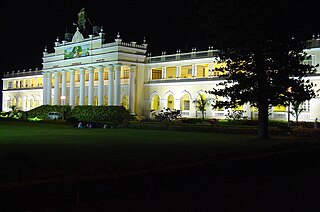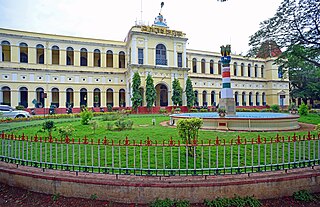
The University of Mysore is a public state university in Mysore, Karnataka, India. The university was founded during the reign of Maharaja Krishnaraja Wadiyar IV and the premiership of Sir M. Visvesvaraya. The university is recognised by the University Grants Commission for offering higher studies degree courses on-campus as well as online. It was inaugurated on 27 July 1916. Its first chancellor was the maharaja himself; the first Vice-Chancellor was H. V. Nanjundaiah. This was the first university outside of British administered Indian provinces, the sixth in the Indian subcontinent as a whole, and the first in Karnataka. It is a state university of the affiliating type, and was deemed autonomous within the Republic of India on 3 March 1956, when it gained recognition from the University Grants Commission.

Neelakanta Ramakrishna Madhava Menon was an Indian civil servant, lawyer and legal educator, considered by many as the father of modern legal education in India. He is the founder of National Law Universities system and first director of the National Law School of India University (NLSIU) and the National Judicial Academy, Bhopal and the founder-vice-chancellor of the West Bengal National University of Juridical Sciences (NUJS). He has also served as Chairman of Indian Statistical Institute from 2002 to 2003.

Rao Bahadur and Rai Bahadur, abbreviatedR.B., was a title of honour bestowed during British rule in India to individuals for faithful service or acts of public welfare to the Empire. From 1911, the title was accompanied by a medal called a Title Badge. Translated, Rao means "prince", and Bahadur means "brave" or "most honourable". Bestowed mainly on Hindus, the equivalent title for Muslim and Parsi subjects was Khan Bahadur. For Sikhs it was Sardar Bahadur.

The Sritattvanidhi is a treatise written in the 19th century in Karnataka on the iconography and iconometry of divine figures in South India. One of its sections includes instructions for, and illustrations of, 122 hatha yoga postures.

Ambale Ramakrishna Krishnashastry (1890–1968) was an Indian writer, researcher and translator in the Kannada language. Krishnashastry has remained popular four decades after his death through his work Vachana Bharata, and his narration of the Hindu epic Mahabharata in the Kannada.
Karnataka Forum for Dignity (KFD) was an Islamist organization in the Indian state of Karnataka. Formed in the year 2001, it was active in the coastal city of Mangalore and in the districts of Udupi, Dakshina Kannada, Kodagu of Karnataka state and in Kasargod district of Kerala state. The group merged with Kerala-based extremist Islamist organisation Popular Front of India (PFI) on 22 November 2006.
N. V. Krishna Warrier was an Indian poet, journalist, scholar, academician and political thinker. A prolific writer, Warrier's works covered the genres of poetry, drama, travelogue, translation, children's literature and science. He was a recipient of the Sahitya Akademi Award and the Kerala Sahitya Akademi Award for Poetry. The Kerala Sahitya Akademi honoured him with their fellowship in 1986, three years before his death in 1989.

Ganjam Venkatasubbiah, also known as G. V., was a Kannada writer, grammarian, editor, lexicographer, and critic who compiled over eight dictionaries, authored four seminal works on dictionary science in Kannada, edited over sixty books, and published several papers. Recipient of the Kannada Sahitya Akademi Award and the Pampa Award, Venkatasubbiah's contribution to the world of Kannada Lexicography is vast. His work Igo Kannada is a socio-linguistic dictionary which encompasses an eclectic mix of Kannada phrases, usages, idioms, and serves as a reference for linguists and sociologists alike.

Mysore Hiriyanna (1871–1950) was an eminent Indian philosopher, Sanskrit scholar and authority on Indian aesthetics. He was a Professor of Sanskrit at the University of Mysore and a contemporary of Sarvepalli Radhakrishnan. His classes on Indian Philosophy were comprehensive. His classroom dictations, published by Allen & Unwin in book form as "Outlines of Indian Philosophy" brought Hiriyanna international recognition. This was a seminal work on Indian Philosophy. His other prominent works include "Indian Conception of Values", "Essentials of Indian Philosophy", "The Quest after Perfection" and "Art Experience". He wrote extensively on the Vedic age, mainly on the Upanishads, followed by the evolution of Indian philosophical thought in the post-vedic era, deliberating mainly on Bhagavad Gita, the early years of Buddhism and Jainism. His work on aesthetics was authoritative and dealt mainly with Alamkaras, Aesthetics and Ethics, Method of Art, Indian Aesthetic Values and Art & Morality.

Tumkur University was established in 2004 in Tumkuru, Karnataka, India. It was carved out of Bangalore University to accommodate the needs of the students from Tumkuru district. Established under the Karnataka State Universities Act, 2000, as a multi-faculty university, it has 12 postgraduate departments, 2 constituent colleges and 94 affiliated colleges. It established 29 research centres to promote advanced multi-disciplinary research and academic collaborations. In 2012, the university was recognized under section 12(b) of the UGC Act, 1956. In the same year, the National Assessment and Accreditation Council (NAAC), an inter-university council of the UGC, accredited the university with "B" Grade in the three-grade rating scale.

Maharaja's College, Mysore (1889) is a college affiliated to Mysore University.

Central College Bengaluru (1858) is one of the oldest colleges in India. This college was originally affiliated to University of Mysore in Mysore State. Rev. John Garrett was the first principal of the Central High School, which was afterwards renamed Central College. In 1964, with the reorganization of the Indian state and the formation of Karnataka, Central College was transferred to Bangalore University, a new university formed in 1965 to meet the needs of the people of Bengaluru. Initially, the two colleges of the city, the Central College (CC) and the University Visvesvaraya College of Engineering (UVCE) formed the nucleus of Bangalore University.
Sarada Vilas College, located in the city of Mysore, Karnataka, India was established in the year 1945 as an Intermediate college. Seven years later, it was upgraded as a Degree college. It now offers eight combinations encompassing physical as well as natural science, all leading to the B.Sc. degree. Students can pursue any one of the following combinations.
- Physics, chemistry and mathematics (PCM)
- Physics, electronics and mathematics (PEM)
- Physics, mathematics and computer science (PMCS)
- Electronics, mathematics and computer science (EMCS)
- Chemistry, botany and zoology (CBZ)
- Biochemistry, microbiology and biotechnology (BMBt)
- Chemistry, zoology and biotechnology (CZBt)
- Biochemistry, microbiology and botany (MBB)
- B.Com
- BBA
- M.Sc
- M.Com
- B.Sc (Hon's) in Data Science and Artificial Intelligence

Sreekumari Ramachandran is a Malayalam–language novelist, short story writer, orator, columnist, trained dancer and an accomplished singer from Kerala, India.

Sondekoppa Srikanta Sastri was an Indian historian, Indologist, and polyglot. He authored around 12 books, over two hundred articles, several monographs and book reviews over four decades in English, Kannada, Telugu and Sanskrit. These include "Sources of Karnataka History", "Geopolitics of India & Greater India", "Bharatiya Samskruthi" and "Hoysala Vastushilpa". S. Srikanta Sastri was a polyglot well versed in fourteen languages spanning Greek, Latin, Pali, Prakrit, Sanskrit and German among others. He was Head of the Department of History & Indology at Maharaja College, University of Mysore between 1940 and 1960. He was conferred the Kannada Literary Academy award in 1970 and was subsequently honoured by Governor of Karnataka Mohanlal Sukhadia in 1973 during mythic society diamond jubilee function. A Festschrift was brought forth and presented to him during his felicitation function in 1973 titled "Srikanthika" with articles on History and Indology by distinguished scholars. His work on Indus Valley civilization and town planning at Harappa and Mohenjodaro were published in successive articles and drew considerable attention. His articles on The Aryan Invasion theory, the date of Adi Sankaracharya, Oswald Spengler's view on Indian culture, Jaina epistemology, Proto-Vedic religion of Indus Valley Civilization and evolution of the Gandabherunda insignia remain relevant today.

Vontikoppal or Vani Vilas Mohalla is one of the busiest suburbs of Mysore city.

SBRR Mahajana First Grade College (Autonomous) Jayalakshmipuram, Mysore is a College with Potential for Excellence accredited A Grade by N.A.A.C. during its 3rd Cycle and affiliated to University of Mysore. The college was founded in 1982 as a women's college offering B.A. & B.Com. courses. It was admitted to the grant-in-aid in 1987 and in 1988 became a co-educational institution. B.Sc. course was introduced in 1989, BBM course & Bio-technology, Biochemistry & Microbiology combination in B.Sc. were added in 1994 & 2004 respectively. BCA course was introduced in 2009. The College has applied for Autonomy and got the Autonomous status in 2019 from Mysore University.
Manju Swaraj is an Indian film director, screenwriter who works in Kannada cinema. He rose to fame with 2009 film Shishira, 2013Shravani Subramanya.2017Srikanta and 2017Pataki, 2019Mane Maratakkide.

Venkataramaiah Seetharamaiah commonly known as Vee See, was a Kannada poet, writer, essayist, critic, editor and teacher who taught Kannada literature at University of Mysore between 1928 and 1955. He is a recipient of the Karnataka Sahitya Akademi Award (1973), Kendra Sahitya Akademi Award and an Honorary Doctorate from University of Mysore in 1976. He presided over the 36th Kannada Sahitya Sammelana at Kumta in 1954.
Jayalakshmipuram is an urban commercial and residential suburb of Mysore city in Karnataka state, India. Residence of Noted Kannada Poet Javaregowda is located in Jayalakshmipuram.
















